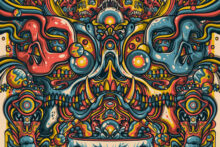It’s often assumed that goth is an adolescent preoccupation; one that many young people grow out of. Wouldn’t it make greater sense for people to grow into it, as our bodies stiffen, loved ones depart and the pesky grave looms ever nearer?
Besides the pressing issue of mortality, as one ages it becomes harder to fathom the rapid transformations taking place around us and that can exacerbate the sense of isolation. It was the comedy writer Douglas Adams who, as the millennium approached, sought to downplay fears about the internet by explaining our relationship to any new-fangled technology: “everything that’s already in the world when you’re born is just normal … anything that gets invented between then and before you turn thirty is incredibly exciting and creative and with any luck you can make a career out of it … anything that gets invented after you’re thirty is against the natural order of things and the beginning of the end of civilisation as we know it …”
That was easy for him to say in 1999! Before horn-hatted suckers stormed buildings in the name of QAnon. Before Kanye West, who’s proudly never read a book, started wearing stockings on his head and claiming to know precisely what Adolf Hitler was all about. Before opportunistic pipsqueaks, ex-reality TV loudmouths and private school dropouts made names for themselves (and clicks for their patrons) with increasingly incendiary pronouncements which serve to erode humanity’s empathy for the less fortunate members of our society. Before the public and politicians valued influencers over expertise. Before whole train carriages became subject to the disjointed racket of one individual’s TikTok feed because earphone courtesy is growing extinct. Before all that daft stuff covered by Jon Ronson in his podcasts which I’ve been meaning to catch-up on when not otherwise distracted by doomscrolling through timelines awash with vehement and violent non-compromise.
At least we got this marvellous record out of it, though, an album that explores our reliance on technology and the impact of its algorithms via brittle riffs, moody synth work and baritone despair.
Cower’s second album retains some of the scrawling noise-scapes and post-punk elements of their 2020 debut, Boys. It also sounds several stages more massive – even, at times, arena-worthy. It’s unlikely that will happen, given Cower aren’t bankrolled by Sony or managed by Peter Mensch and Celestial Devastation is being pressed in only a few hundred copies. To reach the height on the greasy pole that’s rich with $90 hoodies and Bacardi Breezer partnerships, it would also mean channelling complete commitment into just one project with those specific goals in mind. The catholic tastes of these men could never be satisfied by such a narrow focus. Wayne Adams alone is a member of approximately fifty percent of the underground bands that exist in Britain right now. And the other half he produces at Bear Bites Horse studios.
The band are a super-trio, basically – even if they’re not formed of household names like Cream, Them Crooked Vultures or The Three Tenors. It can depend on the household, mind. The members are Gareth Thomas (USA Nails / Silent Front), Thomas Lacey (Yards / The Ghost Of A Thousand) and the evidently inexhaustible Adams (Petbrick / Death Pedals / Big Lad / JAAW / etc., etc., etc.).
While recording this album, it dawned on Cower that they are “all goths at heart”. As Thomas explains further, “maybe our influences are worn a bit more on our sleeves with it too so I probably don’t need to mention who it is we were trying to rip off.” Well, there is a difference between ripping off something and actually improving on its blueprint. Or at least doing a better job than the original source does at ripping off its own earlier innovations, later down the line, when originality has long become reliable formula.
To put it another way, ‘Hard-Coded In The Souls Of Men’, ‘Deathless And Free’ and ‘Ageing Stallions’ are three of the best songs Depeche Mode never wrote. Yes, last year’s Memento Mori was a solid addition to the canon and warmly received as such. Expectations weren’t at their highest regarding a band in its fortieth decade and there was a lot of goodwill given they were down to two founding members after the sudden death of Andy Fletcher. Without wishing to sound too glib about that sad fact, it’s hard to listen to Celestial Devastation without picturing how exhilarating it would be for Depeche Mode (or Gary Numan or Killing Joke or Soft Cell…) to knock an album as potent as this one out of the park.
As if to emphasise the shift towards relative accessibility, the album opens with a piano ballad which on first impression might seem like a mournful breakup song, not least because it is titled ‘We Need To Have The Talk’. The line that sticks out most noticeably on initial listen occurs about halfway through, the theatrically crooned “That fucking wizard needs an acid bath”, and it suggests a different perspective is being offered from that of ‘Go Your Own Way’ by Fleetwood Mac.
The song still seems to be about severing ties, from a lover or a friend or the person in the adjoining office cubicle, because they haven’t fact-checked the information that’s fed to them, questioned misleading sources, or noticed that Ayn Rand eventually relied on the very welfare support she’d scorned during her dubious writing career. Perhaps it is sung from the perspective of Billie Piper, sighing down the telephone to her deluded boob of an ex-husband.
The heavier pieces have the dark throb of Nine Inch Nails when Trent Reznor’s heart was still in it. The lyrics, however, are more sophisticated than those sung by certain acts to which Cower are paying homage. With Nine Inch Nails, in particular, there were the fairly juvenile interests of The Downward Spiral (Carnal lust! Firearms! The Manson Family! Swine! Self-disgust as a platinum-selling humble brag!) Then came its extension with the fame-is-shallow Roger Waters-isms of The Fragile. That was followed by whatever Trent’s been banging on about since. George W. Bush? Trump? Global warming? Haven’t really been listening, to be honest.
As well as the uncertain technological situation we find ourselves in, Celestial Devastation is also about growing older. As far as kitchen-sink accounts of existential dread go, ‘Hard-Coded In The Souls Of Men’ is one of the bleakest that’s ever been committed to tape. It haunts the psyche from first exposure, thanks to the vividly miserable descriptions in its verses, combined with an irresistibly infectious chorus.
Cower have deftly timed this swerve into gothstalgia. Published last year were at least three widely reviewed books on the subject, from Cathi Unsworth, Lol Tolhurst and John Robb. Fashion designers, too, embraced the Wednesday Addams look for the first time in a while. The Beetlejuice sequel is due this September and creepy horror films are more popular than ever.
With this steady stream of memoires, sequels and spin-offs, goth is starting to look a little long in the tooth. Luckily, Celestial Devastation is the goth record for grown-ups.






